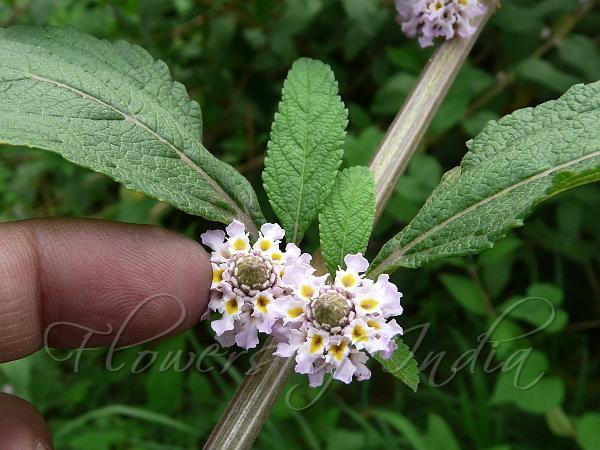|
| Bushy Lippia |
|

|

| File size | 535326 |
| Original date | 6/4/10 4:07 PM |
| Resolution | 1800 x 1350 |
| Flash | Flash did not fire, auto |
| Focal length | 4.6mm |
| Exposure time | 1/125s |
| Aperture | 4.0 |
| Focus Distance | |
| Metering Mode | Multi-segment |
| Camera make | Panasonic |
| Camera model | DMC-FZ18 |
| Sensor type | OneChipColorArea |
|
|
|
|
Photo: |
Botanical name: Lippia alba Family: Verbenaceae (Verbena family)
Synonyms: Lantana alba, Lantana cuneatifolia, Lippia obovata
Synonyms: Lantana alba, Lantana cuneatifolia, Lippia obovata
Bushy Lippia is a straggling shrub about 4-6 ft
tall, with a close resemblance to
Lantana. Young branches are velvet-hairy,
hairless when mature, branches 4-angular, furrowed, round at nodes.
Leaves are decussate-opposite, lanceshaped-oblong 3-10 x 1.5-3.5 cm
across, base narrowed to pointed, margin sawtoothed, tip pointed,
chartaceous, sparsely velvet-hairy above, silvery velvet-hairy beneath,
lateral veins 5-9 on either side of the midvein, more prominent
beneath. Leaf-stalk are velvet-hairy, slender, about 1 cm long,
exstipulate. Flowers are borne in leaf-axils, in a solitary spike or
cylindric head, flower-cluster-stalk hairy, round, about 0.5-2.5 cm
long. Flowers are stalkless, aromatic, calyx cup-shaped, 2 lobed bracts
lanceshaped, base fused, forming a circular cup, tip 2 toothed, hairy,
velvet-hairy. Flower hypocrateriform, bluish purple, 4 lobed, upper 2
lobes notchedd, lower 2 lobes deflexed, Flower tube narrow, cylindric,
tip ampliate 5 x 1 mm, Stamens are 4, didynamous, filaments hairless,
slender, anthers ovoid or spherical, stigma oblong, Fruit is a drupe,
pear-shaped, about 2 x 1.5 mm hard, bony, separating into 2-seeded
pyrenes. Bushy Lippia is native of South America, naturalized in parts
of India.
Medicinal uses: A tea made from the leaves is
a favourite domestic remedy in Central America for both intestinal and
respiratory disturbances, including influenza. A well-sugared infusion
is drunk to bring relief of heart problems and to soothe tachycardia.
Used externally, the aromatic leaves are used in herbal baths, to cure
fevers and severe stomach pain, and to cleanse the bladder[.
A tea made from the leaves is
a favourite domestic remedy in Central America for both intestinal and
respiratory disturbances, including influenza. A well-sugared infusion
is drunk to bring relief of heart problems and to soothe tachycardia.
Used externally, the aromatic leaves are used in herbal baths, to cure
fevers and severe stomach pain, and to cleanse the bladder[.
Medicinal uses:
 A tea made from the leaves is
a favourite domestic remedy in Central America for both intestinal and
respiratory disturbances, including influenza. A well-sugared infusion
is drunk to bring relief of heart problems and to soothe tachycardia.
Used externally, the aromatic leaves are used in herbal baths, to cure
fevers and severe stomach pain, and to cleanse the bladder[.
A tea made from the leaves is
a favourite domestic remedy in Central America for both intestinal and
respiratory disturbances, including influenza. A well-sugared infusion
is drunk to bring relief of heart problems and to soothe tachycardia.
Used externally, the aromatic leaves are used in herbal baths, to cure
fevers and severe stomach pain, and to cleanse the bladder[. | Identification credit: Tabish | Photographed in Shillong, Meghalaya. |
• Is this flower misidentified? If yes,